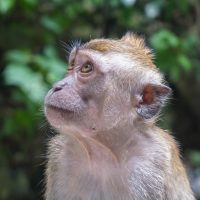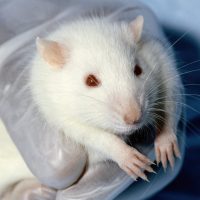Is There Animal Testing Facilities In Washington?
The University of Washington prides itself on being a meridian-tier scientific establishment, and yet, it is anything just that when it comes to how they treat animals and the types of experiments they let to exist conducted on the animals imprisoned at the University of Washington.
These UW laboratories aren't open to the public and their being kept hidden from view from near students, alumni and tax payers. UW researchers effort to convince the public that knowledge gained from animal studies tin exist extrapolated to humans yet their scientific papers reporting the results of inquiry repeatedly include a disclaimer warning nigh making such an assumption.
But it isn't only the uselessness and wastefulness of these animal experiments that should horrify everyone who learns about them. It is the tragic and terrible means that burgeoning scientists are taught to treat living beings – each with their own emotional, environmental, and concrete needs – every bit if they were not sentient at all. No normal good for you human would willingly conduct these experiments except when taught to plough this role of their ethical reasoning system off.
Convenance, capturing, exploiting, torturing, and then killing primates in the proper noun of education and science must be talked about openly. This is the time to talk nigh animal ethics, beast law, and education at the UW. The UW is i of the most progressive learning institutions in the world, but in this 1 area, it continues to work and teach in the night.
What kind of experiments does the University of Washington perform on animals?
The University of Washington is involved in a variety of experiments on animals.
Brain experiments: Experiments on the brain are a mutual area of animal research. These experiments often involve surgically cutting into the skulls of animals to access the brain ("craniotomies"), surgically implanting electrodes into the animals' brains, and other types of surgeries. Specific studies include:
- Oxygen deprivation of infant macaques: One report involved depriving baby macaques of oxygen while they were still fetuses by clamping their umbilical cords, delivering the infant macaques early which required them to exist resuscitated, surgically implanting electrodes into their scalps, further depriving them of oxygen for the first 3 days of their lives, and and then euthanizing the macaques when they were eight days old (McAdams et al., 2017).
- Implantation of electrodes in macaques' brains: Ane study involved surgically implanting electrodes into macaques' brains, and then monitoring their brains while the macaques were forced to perform a visual tracking task (Shushruth et al., 2018).
- Electric stimulation of macaques' brains: 1 study involved surgically opening the skulls of macaques, inserting electrodes into their skulls, and applying beta stimulation to the outer layer of the macaques' brains (Zanos et al., 2018).
Pregnancy experiments: Researchers often use primates and other animals in studies to study pregnancy. These studies are ofttimes surgically invasive to both the female parent and fetus. Specific studies include:
- Artificially enlarging the uteri of meaning macaques: Ane study involved studying uterine overdistension, which is a condition during pregnancy when the uterus is larger than normal due to amniotic fluid or a big baby. Researchers induced uterine overdistension in six pregnant macaques by implanting balloons within the macaques' uteri, which caused three of the six macaques to have preterm labor. The baby macaques were then delivered by cesarean section and euthanized (Waldorf et al., 2015).
Eye and vision experiments: Some experiments involve studying the eyes of animals, which often involve surgery. Specific studies include:
- Giving macaques lazy eye (amblyopia): One written report involved giving macaques lazy eye by surgically cutting the retinal muscles of some macaques, and forcing other macaques to habiliment contact lenses which induced lazy heart (Pham et al., 2018).
- Southwardurgically cutting out and modifying monkeys' eyes: One study involved researching how macaques perceived color, and involved removing the eyes of anesthetized monkeys and and then cutting out several parts of the eyes in lodge to study them (Wool et al., 2018).
As of 2019 (according to the Annual Report filed with the USDA), in that location are:
- 540 Non-human primates (generally macaques). There are another 513 non-human primates existence held in a breeding facility in Arizona.
- 23 dogs being kept for breeding purposes, 18 dogs beingness used for inquiry purposes. All of these animals are kept in cages and practice not have admission to the outdoors.
- 164 ferrets being used for research, and 109 ferrets being used for breeding purposes.
History of Animal Research at the University of Washington

History of Fauna Corruption at the Academy of Washington

Institutional Beast Intendance and Apply Commission (IACUC)

Washington National Primate Research Center (WA-NPRC)

EVENTS – SPEAK UP FOR ANIMALS IN LABS!
The force per unit area to end not-man animal experiments, especially primate experimentation, continues to mount. The public is being exposed to media proving what happens in the laboratories and continue to question the value of the scientific discipline behind primate suffering. Aid us end primate experimentation starting right here in Seattle, and help the UW move into a future where humans explore alternatives to exploiting other species to thrive.
NARN's Animals In Labs Committee meets virtually on the 2nd Wed of the month.
REGISTER Hither TO ATTEND
Speak upwards at the Monthly IACUC Public Meeting
See coming together details here
IACUC Meeting Recap Q&A with NARN
Later every IACUC Meeting, a NARN representative will be available to answer your questions about topics that were discussed at the IACUC meeting every bit well as animal research and animal research at the UW specifically. This is a swell opportunity to find out more nearly what goes on at the UW.
The meeting will be informal & gratuitous-flowing, then bring your questions or conundrums. Meeting time is tentatively scheduled for 4pm, but if the IACUC meeting runs over (unlikely), the meeting volition start after the end of the IACUC
REGISTER Here TO ATTEND
End Primate Testing at UW - Contact UW!
Ask the University of Washington to End the Use of Primates in Testing Labs, Shut the Breeding Facility
Source: https://narn.org/animals-in-labs/
Posted by: herronoverniseents1972.blogspot.com

0 Response to "Is There Animal Testing Facilities In Washington?"
Post a Comment